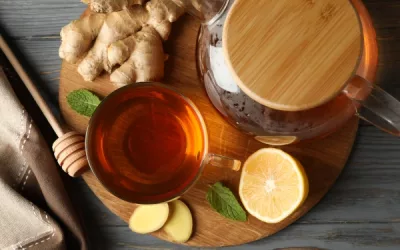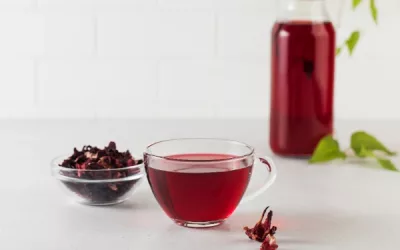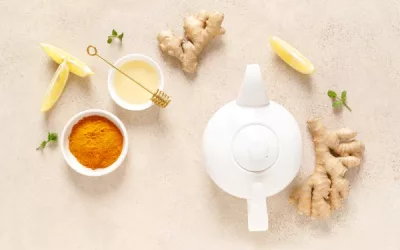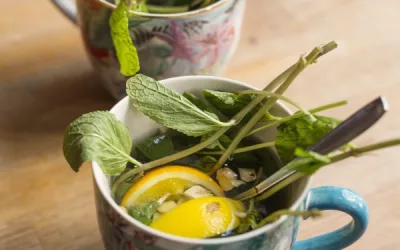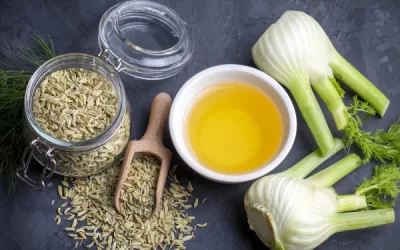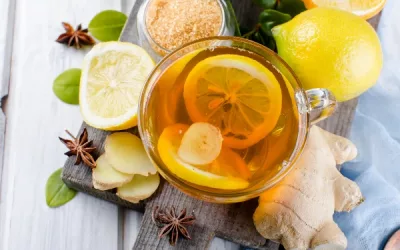Did you know that nettle leaf, often seen as a pesky weed, has been treasured for centuries for its remarkable health benefits? This article delves into the multifaceted world of nettle leaf, exploring its significance in natural remedies and herbal medicine. By uncovering its impressive nutritional profile, preparation methods, and traditional uses, we’ll illuminate how this humble plant can enhance your well-being. Join us as we uncover the hidden potential of nettle leaf and its role in a balanced diet and sustainable living.
Table of Content
- What is nettle tea?
- How should nettle leaf be prepared for consumption?
- What nutritional value does nettle leaf offer?
- What are the traditional uses of nettle leaf in herbal medicine?
- What precautions should be taken when using nettle leaf?
- What are the signs of an allergic reaction to nettle leaf?
- How does nettle leaf fit into a balanced diet?
- What are the environmental benefits of cultivating nettle leaf?
- Conclusion
What is nettle tea?
Nettle leaf, derived from the stinging nettle plant (Urtica dioica), has been used for centuries in traditional medicine. The plant’s leaves are rich in vitamins, minerals, and antioxidants, making them beneficial for various health conditions.
When prepared correctly, nettle leaf can help reduce inflammation, alleviate allergies, and promote urinary health. It is commonly consumed as a tea, tincture, or supplement, and its anti-inflammatory properties make it popular for treating arthritis and other joint-related issues.
Additionally, nettle leaf is known for its diuretic properties, aiding in detoxification and kidney function. It is also used to support hair growth and skin health due to its high content of vitamins A, C, and K, as well as essential minerals like iron and calcium.
Despite its potential to cause a stinging sensation when touched raw, once processed, nettle leaf becomes a highly versatile herbal remedy suitable for everyday wellness routines.
How does nettle leaf contribute to overall wellness?
Nettle leaf’s contribution to overall wellness is multifaceted. Here’s how it can enhance your health:
- Nutrient Density: Nettle leaf is a powerhouse of essential vitamins and minerals, including vitamins A, C, K, and several B vitamins, as well as iron, calcium, magnesium, and potassium.
- Antioxidant Properties: The rich antioxidant content in nettle leaf helps combat oxidative stress, which can lead to chronic diseases and premature aging.
- Immune Support: The high vitamin C content boosts immune function, helping your body ward off infections.
- Detoxification: Nettle leaf can aid in detoxifying the body by supporting the kidneys and promoting the elimination of toxins.
- Skin Health: Its anti-inflammatory and antioxidant properties can improve skin health, reducing redness, irritation, and even acne.
These attributes make nettle leaf a valuable addition to a wellness routine, enhancing various aspects of health.
In medieval Europe, nettle leaf was often used as a remedy for arthritis and other ailments. One of the more fascinating stories involves the Roman soldiers. When they invaded Britain, they brought nettle seeds with them, knowing they could use the plant to keep warm during the cold winters.
They would rub the nettle leaves on their skin, causing irritation and subsequent warmth. This historical practice underlines nettle leaf’s long-standing reputation for medicinal use.
I remember when I first discovered nettle leaf’s benefits. I had been struggling with seasonal allergies for years, and someone suggested I try nettle tea. I was sceptical at first, but after a few weeks of regular use, I noticed a significant reduction in my symptoms.
It was a game-changer for me, allowing me to enjoy outdoor activities without the constant sneezing and itchiness. It’s now a staple in my herbal remedy cabinet.
How should nettle leaf be prepared for consumption?
Nettle leaf, a potent herb known for its medicinal properties, can be prepared in various ways to ensure its safe consumption. Preparing nettle leaf properly is crucial to unlock its benefits while avoiding any potential side effects. Whether you’re new to using nettle leaf or a seasoned herbal enthusiast, this guide will help you understand the different preparation methods.
Preparing nettle leaf for consumption involves some simple steps. You can use it in teas, soups, salads, or even as a supplement. Each method has its unique advantages and precautions. Let’s break down these methods in an easy-to-follow table below. This will help you choose the best way to incorporate nettle leaf into your routine.
Preparation methods of nettle leaf
To make it easy to choose the right preparation method, here’s a table that summarises different ways to prepare nettle leaf. The table includes the method, a brief description, benefits, and precautions to consider:
| Method | Description | Benefits | Precautions |
|---|---|---|---|
| Tea | Steeping dried nettle leaves in hot water | Helps in detoxification, relief from allergies | Avoid if allergic to nettle or during pregnancy |
| Infusion | Soaking dried leaves overnight in cold water | Rich in nutrients, good for iron intake | Use fresh, clean water; strain before drinking |
| Tincture | Extracting active compounds using alcohol or glycerine | Concentrated form, long shelf life | Follow dosage instructions carefully |
| Capsules | Dried nettle leaf powder encased in capsules | Easy to consume, no taste | Purchase from reputable sources |
| Soup | Adding fresh or dried leaves to soups | Increases nutritional value | Ensure leaves are properly cleaned |
| Smoothie | Blending fresh leaves with fruits and vegetables | Boosts nutrition in diet | Start with small quantities |
| Steamed | Lightly steaming fresh leaves like spinach | Retains most nutrients | Handle with gloves to avoid stinging |
| Salad | Using young leaves in salads after blanching | Fresh, adds flavour to dishes | Requires thorough washing and blanching |
Understanding this table will help you choose the best method for your needs. Each preparation method offers unique benefits and requires certain precautions to ensure safe and effective use. For instance, tea is great for daily detox, while tinctures provide a concentrated dose of nettle’s active compounds.
How to prepare nettle leaf tea
Making nettle leaf tea is one of the most popular methods. It is simple, soothing, and packed with health benefits. Here’s how you can prepare it:
- Boil water and let it cool slightly.
- Add 1-2 teaspoons of dried nettle leaves to a teapot or cup.
- Pour hot water over the leaves and cover.
- Steep for 5-10 minutes.
- Strain and enjoy your tea.
Nettle tea helps in detoxification and provides relief from allergies. However, if you’re pregnant or allergic to nettle, it’s best to consult a healthcare professional before consuming.
How to prepare a nettle leaf infusion
An infusion is like a stronger version of tea, soaking the leaves for a longer period. It extracts more nutrients and is excellent for boosting iron intake. Here’s how to make a nettle leaf infusion:
- Place 1 cup of dried nettle leaves in a quart-sized jar.
- Fill the jar with cold water.
- Cover and let it steep overnight or for at least 4 hours.
- Strain the liquid and refrigerate.
- Drink a cup daily.
Infusions are nutrient-dense and support overall health. Ensure you use fresh, clean water, and strain the liquid properly before drinking.
In ancient times, nettle leaf was cherished by herbalists. In the 16th century, renowned herbalist John Gerard praised nettle for its exceptional medicinal properties in his celebrated work, “The Herball or Generall Historie of Plantes.”
He highlighted its effectiveness in treating various ailments, from arthritis to skin conditions. Gerard’s detailed descriptions contributed significantly to the understanding and use of nettle in herbal medicine.
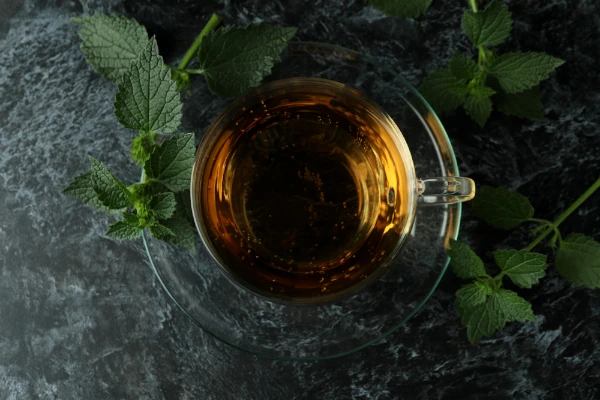
What nutritional value does nettle leaf offer?
So, you’re curious about what nettle leaf can bring to the nutritional table? Well, it’s no lightweight in the leafy green world. Nettle leaf, or stinging nettle, is packed with vitamins and minerals that can kick your diet up a notch. Think of it as the MVP of the herbal medicine cabinet. Intrigued? Let’s dive into the specifics.
Nettle leaf is loaded with vitamin C, iron, calcium, magnesium, and potassium. It’s like Nature’s multivitamin, but with a bit more sting. Vitamin C, a notable anti-oxidant, is essential for immune function and skin health.
Iron is vital for blood production and cellular energy. Calcium is king when it comes to bone health, and magnesium is crucial for muscle and nerve function. Lastly, potassium helps regulate fluid balance, muscle contractions, and nerve signals.
Now, if you’re still reading (and I hope you are), let’s get into the nitty-gritty with some comparisons and implications.
How does the nutritional content of nettle leaf compare to other leafy greens?
When comparing nettle leaf to other leafy greens like spinach, kale, and Swiss chard, you might be surprised how it stacks up.
- Vitamin C: Nettle leaf has higher concentrations than spinach and kale, which can give your immune system a solid boost.
- Iron: It contains more iron than spinach, making it a great option for those who need an iron-rich diet.
- Calcium: While nettle leaf has a rich calcium profile, it’s slightly less than what you’d get from spinach but still notable.
- Magnesium: Comparable to other greens, making it just as good for muscle and nerve functions.
- Potassium: Nettle leaf stands shoulder to shoulder with spinach and kale, excellent for maintaining fluid balance.
In the battle of the greens, nettle leaf is an underdog with some serious punch. If leafy greens had a wrestling match, nettle leaf would probably body-slam most of its competitors.
What are the implications of its nutritional profile for a balanced diet?
Imagine your diet as a balanced team, where every member must play its part. With nettle leaf on the squad, you get a well-rounded player that can help fill several nutritional gaps.
- Immune Boost: High in vitamin C, nettle leaf helps keep colds at bay.
- Energy Levels: With its iron content, it can assist in reducing fatigue.
- Bone Health: The calcium content contributes to robust bones.
- Muscle Function: Magnesium is essential for muscle strength and nerve function.
- Heart Health: Potassium helps in maintaining a healthy blood pressure.
Bringing nettle leaf into your diet can help harmonise these nutrients, giving you a more balanced plate. It’s like adding a player who excels in multiple sports to your team.
Can nettle leaf help in meeting daily nutrient requirements?
Absolutely, and without a doubt. Nettle leaf is a multitasker in the world of nutrients. It can help bridge the gap in your daily vitamin and mineral intake.
- Vitamin C: One serving can provide a significant chunk of the daily recommended intake.
- Iron: Helps meet daily requirements, especially useful for those prone to anaemia.
- Calcium: Supports your calcium intake along with dairy or fortified products.
- Magnesium: Contributes to the daily intake for better muscle and nerve function.
- Potassium: Assists in achieving the daily recommended amount, crucial for heart and kidney health.
In summary, integrating nettle leaf into your meals or supplements can help you hit those pesky daily nutrient requirements like a pro.
When it comes to historical tales, let’s talk about a bit of medieval medicine. During the Middle Ages, nettle leaf was considered a cure for numerous ailments. Monks kept herb gardens full of medicinal plants, and nettle was a staple.
They’d use the leaves to treat arthritis, coughs, and even snake bites. Imagine a time when a simple herb was your go-to pharmacy. So, nettle leaf isn’t just healthy; it comes with a hefty dose of historical charm.
Now, wouldn’t you want this humble yet powerful leaf on your nutritional team? Keep calm and nettle on!
What are the traditional uses of nettle leaf in herbal medicine?
Let’s dive into the fascinating world of nettle leaf, that common yet mighty plant. For centuries, nettle leaf has been a heroic figure in herbal medicine. Ancient Greeks praised its prowess, the Romans utilised it during military campaigns, and even today, herbalists swear by it.
Here’s the lowdown on nettle leaf’s storied journey.
How has the use of nettle leaf evolved over time?
Nettle leaf usage has quite the colourful past. In ancient times, people used it to flog themselves for increased circulation (yes, you read that right.). Now, we’re a tad more civilised and prefer nettle tea or capsules.
The Greeks and Romans used it to treat everything from arthritis to exhaustion. Fast forward to modern-day herbalists, they recommend it for detox, reducing inflammation, and even combating hay fever.
- Ancient Greeks and Romans: Used nettle for joint pain, fatigue, and as a diuretic.
- Medieval Europe: Nettles were woven into cloth and consumed for overall health.
- Modern Herbalists: Advocating nettle for allergies, detoxification, and anti-inflammatory purposes.
- Contemporary Uses: Found in teas, capsules, and tinctures.
So, from flogging to sipping tea, nettle leaf has undeniably stood the test of time and transformed gracefully.
What cultures have historically used nettle leaf for medicinal purposes?
The love affair with nettle leaf spread across many cultures. The Greeks and Romans were the pioneers, and who could blame them? In Europe, nettle found its way into folk remedies and food.
Scandinavians made nettle soup, and the Native Americans had varied uses, from treating wounds to helping clear out the evil eye.
- Greeks and Romans: Top users for medicinal and military endurance.
- European Cultures: Medieval Europe loved it for overall wellness and nutritional benefits.
- Scandinavian Countries: Nettle soup to ward off seasonal ailments.
- Native American Tribes: Used nettle for skin conditions and pain relief.
From soup to potions, nettle leaf has been a key player across geographies and centuries.
Are there any modern herbalists who advocate for its use?
Heck yes! Modern herbalists are passionate about nettle leaf. If you chat with any herbalist today, they’ll likely extol its virtues for everything from allergies to prostate health. Plus, it’s rich in vitamins A, C, and K, which is the kind of multitasking we can all get behind.
- Susun Weed: Renowned herbalist advocating nettle for women’s health.
- David Hoffmann: Believes in its respiratory and urinary tonic properties.
- Rosemary Gladstar: Recommends nettle for nutrient boosting and detox.
- James Green: Highlights its benefits for joint health and allergies.
These herbal gurus champion the green giant, bringing it back into our modern lives.
Nettle leaf’s history is a thrilling mix of culture, evolution, and modern rediscovery. Take, for instance, the story of the Romans. Not only did they bring nettle leaves along to Britain in AD 43, but they also used them to keep warm by rubbing them on their skin to improve blood circulation in the chilly climate.
We might not need to do that today, but it’s a quirky testament to the plant’s tenacity.
What precautions should be taken when using nettle leaf?
Ready to dive into the world of nettle leaf? Hold your herbal horses! Here’s the lowdown on potential pitfalls and must-know precautions. We’ll cover everything, from unexpected nose-twitching allergies to who should just say “no” to nettle. Buckle up, buttercup.
Allergic reactions
You ever accidentally pick a fight with a stinging nettle? Welcome to the world of herbal adventures. But outside of the wild, nettle leaf can occasionally spark an allergic showdown.
Here’s what to watch out for:
- Itchy skin: Oh, how delightful. A list-topping symptom of nettle leaf allergies.
- Hives: Those lovely, raised welts that scream, “I’m allergic!”
- Swelling: Puffier than a marshmallow in hot chocolate.
- Difficulty breathing: Always a party crasher and a cue to call for help.
So, if you happen to exhibit these signs, ditch the nettle leaf faster than a bad date and consult your PR (Personal Rescuer, aka your doc).
Dosage recommendations
Nettle leaf isn’t a free-for-all. More isn’t always merrier. Follow the Goldilocks principle here: not too much, not too little, just right.
Some dosage details:
- Nettle tea: Typically 1-2 cups per day, sipping your way to herbal harmony.
- Capsules: Stick to the label’s script, usually 300-600 mg per day.
- Tinctures: Approximately 1-2 ml, armed with a trusty dropper.
Overdosing might have you racing to the bathroom or, worse, developing kidney stones. Follow the herbal commandments and respect your gut.
Interactions with medications
Nettle leaf and meds can be a bit like oil and water – they just don’t mix.
Heads-up for those on:
- Diuretics: Double the take-a-leak effect. Nobody’s got time for that.
- Blood thinners: Extra potent? More like extra risky.
- Blood pressure meds: Nettle’s double-dipping might lead to a downward spiral.
Chat with your medicine guru before you toss back a nettle tincture.
Handling stinging nettles
Want to avoid bringing a sting to your herbal harvest? Glide like a ghost when handling fresh nettles.
Here’s the mantra:
- Gloves are your best friend: Nettles are like little green assassins.
- Scissors: Best tool ever for snipping without suffering.
- Cook or dry: Render those stingers useless with heat or time.
Precision and protection will save you from a prickly predicament.
Contraindications
Certain folks should just stay in the nettle-free zone.
Avoid nettle leaf if you:
- Are pregnant: Nettles can nudge uterine muscles, not a baby-friendly move.
- Have kidney issues: Heavy lifting on the kidneys might exacerbate maladies.
- Are hyperallergic: If you sneeze simply thinking about pollen, steer clear.
Respect the no-go zones and select other herbal allies.
What are the signs of an allergic reaction to nettle leaf?
Thinking nettle leaf might have it out for you? Here’s how to tell if you’re correct.
Look out for signs like:
- Skin rashes: Red, itchy and totally uninvited.
- Hives: Nothing says “allergic” like angry patches of skin.
- Swelling: Especially around the face, lips and tongue.
- Breathing difficulties: Consider it your body’s fire alarm.
If you catch wind of these symptoms, dodge the nettle and hightail it to a healthcare pro.
How can one safely handle nettle leaves?
You swore to master the art of nettle leaf, right? Great, but first, you’ve got to handle these tricksters safely.
Here’s your nettle-handling starter kit:
- Thick gloves: Because your grandma’s knit mittens aren’t up to snuff.
- Scissors: Snip. Snip. No bare-handed grabbing.
- Rinse: Fresh nettles like a cleanup before cooking.
- Drying: Goodbye, irritants! Drying neutralises those pesky stingers.
Once safely subdued, nettle leaf can be your herbal new best friend.
Are there specific groups of people who should avoid nettle leaf?
Sure, nettle leaves are swell, but they ain’t for everyone.
Steer clear if you:
- Are pregnant or breastfeeding: The risk isn’t worth the herbal glory.
- Have chronic kidney disease: Nettles’ heavy-lifting could make it worse.
- Are super allergic: This includes folks with severe pollen allergies.
Stick to the safe side and let others tire nettle out.
Back in the 16th century, famed herbalist Nicholas Culpeper hailed nettle as a fix-all. But he likely didn’t factor in allergies or diuretics in the grand scheme. A dabble in historical herbalism reminds us to blend enthusiasm with caution.
So, folks, remember: respect the nettle, don’t manhandle it, and if in doubt, consult your local herbal wizard (a.k.a, your health practitioner).
Now, off you go, herbally enlightened and nettle-wise!
How does nettle leaf fit into a balanced diet?
Oh, nettle leaf! Not just a plant to avoid in the wild, but a gem in the kitchen. So, how does this prickle-packed plant play well with your daily meals? Glad you asked.
Before you dismiss this leafy wonder as something you’d rather avoid touching, let’s dive into its culinary magic. Versatility is its middle name. You can blend it into smoothies, toss it in soups, or even fry it up with your morning eggs. From its nutritional riches to the way it dances with other ingredients, nettle leaf deserves a standing ovation in your diet.
What are some easy recipes featuring nettle leaf?
Get ready because introducing nettle leaf into your food repertoire is going to be simpler than you think! Recipes at your service:
- Nettle Soup: Think spinach soup but with a twist. Sauté onions and garlic, add potatoes and nettle leaves, simmer in broth, then blend.
- Nettle Pesto: Swap out basil for nettles in your pesto. Blitz with garlic, olive oil, pine nuts, and Parmesan. Perfect over pasta or as a sandwich spread.
- Nettle Smoothie: Toss a handful of nettles into your usual smoothie mix. Pair with fruits like bananas, apples, or berries for a nutrient kick.
- Nettle Risotto: Stir nettles into the risotto during the last 5 minutes of cooking. They add a vibrant green hue and a fresh taste.
- Nettle Tea: Dry the leaves and steep them in hot water. Add honey if you have a sweet tooth, and enjoy a relaxing drink.
Nettle leaf is here to give your meals a nutrient-packed punch. It’s rich in vitamins A and C, iron, and protein. It’s also loaded with antioxidants, so you’re not just eating well, you’re eating smart!
How can nettle leaf enhance the flavour of dishes?
Beyond just looking pretty on your plate, nettle leaf cranks up the flavour dial. It offers an earthy, slightly peppery taste that complements and elevates various dishes.
- Substitute for Spinach: Nettle offers a nuttier flavour and a bit more earthiness. Swap it in coincidently in your spinach recipes.
- Blend with Herbs: Pair nettle with mint, parsley, or dill to create a unique herbal blend for salads and sauces.
- Culinary Balance: Its earthy tone balances the sweetness of roasted vegetables or the richness of a creamy sauce.
- Enhance Smoothies & Juices: Nettle’s mild, slightly sweet flavour blends well with fruity smoothies and green juices.
- Soups and Stews: Adds depth and complexity to broths and stews, making them more hearty and flavourful.
Nettle leaf is like that underrated band that suddenly becomes everyone’s favourite. Its robust flavour can turn a mundane dish into a masterpiece, giving your meals a unique twist.
Are there any dietary restrictions to consider when using nettle leaf?
A little heads-up here. As fantastic as nettle leaf is, not everyone and every diet can accommodate this green buddy.
- Oxalate Content: High in oxalates, so those prone to kidney stones should be cautious.
- Blood Sugar Levels: It can slightly lower blood sugar, so diabetics on medication should monitor their levels.
- Blood Pressure: Could also lower blood pressure; not ideal for those already on medication for that.
- Allergic Reactions: Rare but possible; test a small amount first.
- Pregnancy: Consult a healthcare provider before use during pregnancy or breastfeeding.
- Drug Interactions: Can interact with blood thinners or diuretics, so check with your doctor if you’re on meds.
Nettle leaf isn’t just some green accessory for your plate. Be prudent – all those benefits come with potential issues for some. It’s always best to know before you dive in.
In the spirit of bringing history to life, let’s talk about how nettle leaf has been treasured through the ages. Did you know the Roman soldiers used nettles as a secret weapon? They’d whip themselves with nettles to stay warm and invigorated during the chilly and damp campaigns in Britain.
That’s right – these iron-clad warriors braved the stings for the leaf’s revitalising powers. Today, you don’t have to endure the sting; just pick a leaf, cook it right, and harness its powerful benefits without battling the brambles!
What are the environmental benefits of cultivating nettle leaf?
Nettle leaf is more than just a prickly nuisance you avoid on countryside walks. When cultivated, it offers a boatload of environmental perks. Think of it as Mother Nature’s multitool for soil health, biodiversity, sustainable farming, and even permaculture.
Cultivating nettle leaf isn’t just a boon for eco-friendly gardening but a win-win for the whole biological orchestra. The plant not only cycles nutrients like a pro, providing vital sustenance for other plants, but also becomes a hotspot for various wildlife. Let’s break down the nitty-gritty, shall we?
How does nettle cultivation contribute to soil health?
First off, nettles are like the ultimate soil renewers. Their deep roots work overtime to draw up minerals from the subsoil, which they then share with more shallow-rooted plants.
- Nutrient Cycling: Nettle roots love to scavenge for nutrients deep in the soil and bring them to the surface. When nettles shed their leaves, they decompose, enriching the soil with nitrogen, phosphorus, and other minerals.
- Soil Structure Improvement: The extensive root system of nettle breaks up compacted soil, promoting better aeration and water infiltration.
- Mycorrhizal Fungi: Nettles form symbiotic relationships with fungi that enhance nutrient uptake for a variety of plants.
- Reduction of Soil Erosion: The thick, carpet-like growth of nettle foliage acts as a protective blanket against soil erosion caused by wind and rain.
- Organic Matter Boost: Let your nettles compost naturally; they add organic matter which improves soil fertility over time.
By cultivating nettles, you’re essentially giving your soil a spa day that benefits the entire ecosystem it supports.
What wildlife benefits from nettle plants?
If you thought the humble nettle was just a wallflower in the plant kingdom, think again. It’s practically a five-star hotel for various critters.
- Butterflies and Moths: Species like the Red Admiral and Peacock butterflies lay their eggs on nettles.
- Birds: Birds love the insects that flock to nettles, making it a veritable buffet for them.
- Small Mammals: Creatures like hedgehogs use nettles for cover, and small rodents appreciate the shelter.
- Beneficial Insects: Ladybirds, spiders, and beetles are just a few of the bug buddies that call nettles home.
- Pollinators: Nettles provide nectar to numerous pollinating insects, ensuring that your garden flourishes.
Your nettle patch could be bustling with wildlife, all playing a part in your garden’s health and productivity.
Can nettle leaf be part of sustainable agricultural practices?
Absolutely! Nettle cultivation aligns perfectly with the principles of organic farming and permaculture, making it a favourite among the green-thumbed crowd.
- Sustainable Fertiliser: Nettle leaf liquid manure is an excellent organic fertiliser, reducing the need for synthetic chemicals.
- Pest Control: Nettle indirectly helps in pest management. A healthy population of beneficial insects can keep pests in check.
- Companion Planting: Nettles can be great companions for crops like tomatoes and cucumbers, enhancing their growth.
- Weed Suppression: Their vigorous growth can outcompete less desirable weeds, minimising the need for herbicides.
- Resource Efficiency: Nettles thrive on minimal water and poor soil, making them ideal candidates for low-resource farming systems.
So yes, nettles can be your secret weapon for maintaining a sustainable and efficient agricultural practice.
In the early 20th century, farmers in parts of England facing poor soil conditions turned to nettles as a key crop. Known for their nutrient-boosting prowess, nettles improved soil fertility, enabling other crops to thrive.
This practice wasn’t just a flash in the pan; it created a sustainable farming technique still admired today. Plus, harvesting nettles wasn’t a chore—it turned into a profitable sideline, as people used nettles for everything from animal feed to textile fibres. Now, isn’t that a stingingly good historical tidbit?
Conclusion
In reflecting on the myriad benefits of nettle leaf, I’ve come to appreciate not only its impressive nutritional profile but also its deep-rooted history in herbal medicine. We’ve explored its remarkable anti-inflammatory properties, potential to support joint health, and ability to regulate blood sugar levels, all backed by scientific studies.
These benefits, particularly significant for individuals dealing with arthritis or respiratory issues, highlight why nettle leaf deserves a prominent place in the wellness toolkit of the health-conscious.
The importance of this information cannot be understated; as lifestyles shift towards more natural remedies, the timeless applications of nettle leaf remind us that nature often provides the answers we’re seeking.
Its role as a versatile ingredient can seamlessly integrate into daily meals, whether in soups, teas, or salads. Moreover, understanding the preparation methods discussed serves as a guide for safe consumption, ensuring that we harness the full potential of this remarkable herb.
As I continue my journey into the world of herbal medicine, I see the need for further exploration of nettle leaf’s use across different cultural practices and its impact on sustainable agriculture.
This exploration not only enriches our understanding of nettle leaf but also invites us to ponder our dietary choices and their alignment with health and environmental sustainability.
In closing, let’s consider this thought-provoking question: How might our health transform if we all embraced not just the consumption of nettle leaf, but its cultivation as a reflection of our commitment to both personal and planetary well-being?
Let’s remain curious and motivated to incorporate such valuable elements into our lives, making conscious choices that honour the wisdom nature has to offer.
Resources
- Nutritional and pharmacological importance of stinging nettle
- Nettle Cultivation Practices—From Open Field to Modern Hydroponics: A Case Study of Specialized Metabolites
- Stinging Nettle: Uses and Risks
- Improved glycemic control in patients with advanced type 2 diabetes
- Nutritional value, antioxidant and antidiabetic properties of nettles
- Lipophilic stinging nettle extracts possess potent anti-inflammatory activity
- Mineral Properties and Dietary Value of Raw and Processed Nettle
- Screening of pharmacological uses of Urtica dioica and others benefits
- Nutritional and pharmacological importance of stinging nettle (Urtica dioica)
- How to Increase the Nutritional Quality of Stinging Nettle Through …


